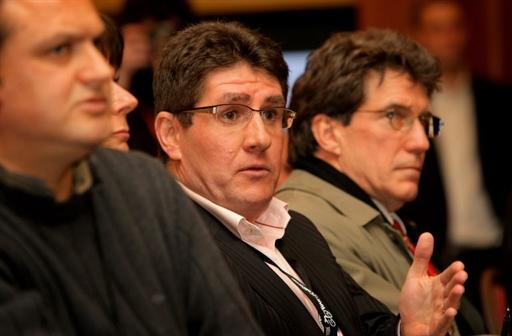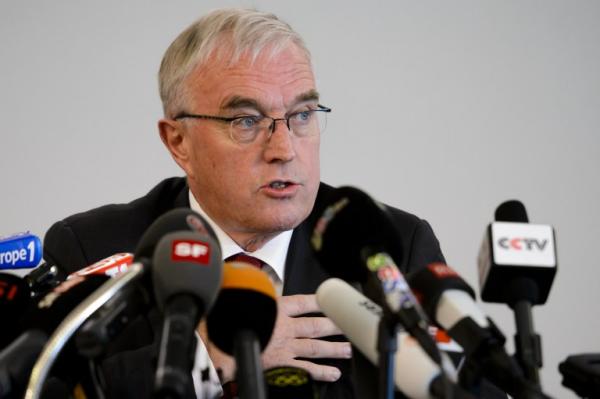Kimmage case is not personal, says McQuaid
UCI president continues with defamation proceedings


On announcing that the UCI would accept USADA’s decision to ban Lance Armstrong for life and strip him of his seven Tour de France titles, Pat McQuaid told the assembled media that it was “the biggest crisis cycling has ever faced.”
Smiling as he rolled out a pre-prepared line hewn from John F. Kennedy, McQuaid proceeded to say: "When written in Chinese, the word ‘crisis’ is composed of two characters. One is danger and the other opportunity. Our sport is in danger but everyone needs to work together to move forward."
And yet in the midst of this global crisis in the sport, a not insignificant portion of the UCI president’s attention seems to be deflected towards a decidedly more local row, namely defamation proceedings against his fellow countryman, the journalist and former rider, Paul Kimmage.
Asked about the Kimmage case during Monday’s press conference, McQuaid played a straight bat, insisting, “This is about a journalist who accused me and my predecessor and the UCI of being corrupt, and it’s a straightforward defamation case.”
McQuaid later sat down before a group of English-speaking journalists, and he was again pressed on his decision to continue with his pursuit of Kimmage through the courts, particularly at a time when his energies should surely be devoted largely to cycling’s wider problems.
While McQuaid initially lauded Kimmage “as a consistent anti-doping advocate,” he added a pointed rider, alluding to his fellow Dubliner’s admitted use of amphetamine at three criteriums in August 1987, a process described in detail in Rough Ride, his eye-opening account of the doping culture in the peloton in the 1980s.
“I know Paul very well, I know him since he was in a pram,” McQuaid said. “I was a good amateur in my day but I took the decision not to go professional and I went to college instead. He went on to turn professional and then he took a decision during that career to dope. I’ve never done that. All I’ve done is ever work for the sport and for the benefit and the good of this sport all my life. I will not accept to be called corrupt. Absolutely, that’s a personal thing and I cannot accept that.”
The latest race content, interviews, features, reviews and expert buying guides, direct to your inbox!
McQuaid would later question whether Kimmage had written Rough Ride for financial motives by bizarrely claiming that David Millar had not actively promoted his 2011 autobiography, Racing Through the Dark. Nonetheless, McQuaid denied that he was taking the Kimmage case too personally.
“It’s a defamation case and it’s not against the Paul Kimmage that I know or the Paul Kimmage that I managed through all his amateur days. It’s nothing to with that, I know the guy very well and he’s a fellow Irishman,” McQuaid said.
“But the guy calls me corrupt and calls the institution that I lead and the 100 people who work for the UCI every day corrupt, I can’t accept that. I have to defend that. I don’t like doing it. I don’t want to do it, but I’m forced to do it. It’s not a personal thing. I shouldn’t have to do it. He’s a journalist and he knows how far he can go. He should be professional and he should know what he can say and what he can’t say.”
While McQuaid, Hein Verbruggen and the UCI seem confident of winning their case from a purely legal standpoint – the same Swiss court found against Floyd Landis in absentia in a similar hearing – there is a notable groundswell of public sympathy for Kimmage’s position.
A spontaneous internet campaign quickly led to a defence fund being set up in support of Kimmage, and at the time of writing, over 2200 donors have contributed a total approaching $70,000.
Kimmage himself admitted to Ireland’s Newstalk radio station on Monday evening that a part of him had hoped that McQuaid would drop the suit, but he was determined to bring a “jumbo jet full of witnesses” to Switzerland to fight his case. Even if Kimmage’s defence is unsuccessful, however, the case has the potential to be a costly pyrrhic victory for the UCI, with a litany of uncomfortable questions set to be aired in public.
“What you have to do here is separate this action from the USADA affair: Paul and some of his journalistic colleagues have done very well to connect the two together,” McQuaid insisted. In Vevey on December 12, the Est Vaudois district court might deliberate further on how closely the two matters are linked.

Barry Ryan was Head of Features at Cyclingnews. He has covered professional cycling since 2010, reporting from the Tour de France, Giro d’Italia and events from Argentina to Japan. His writing has appeared in The Independent, Procycling and Cycling Plus. He is the author of The Ascent: Sean Kelly, Stephen Roche and the Rise of Irish Cycling’s Golden Generation, published by Gill Books.